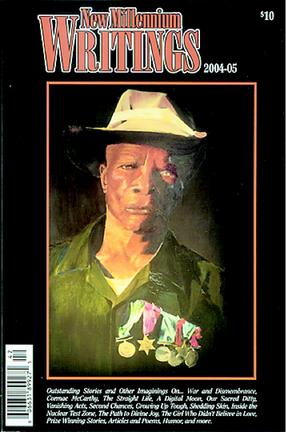The lead story in the current edition, “Straight Life” by Tom Larsen, is both polished and imaginative. It's about an escaped con who maintains a new life with a wife and kids for decades before it all comes full circle.
In David Morse's “Digital Moon,” Drew is a photography professor who feels that greatness has passed him by. I felt that the real tragedy was that Drew is so caught up in the competitive egotism of his shallow colleagues.
By contrast, Drew might have been dealt a hand like the main character in Marc Levy's “How Stevie Nearly Lost the War.” Levy, himself a veteran, has crafted a profound exploration of post-traumatic stress disorder, his prose demonstrating that he is clearly a believer in rewriting. A brilliant achievement.
In Dan Sullivan's “Free Money,” Dennis, a homeless veteran with one leg, bilks the government of aid money for a set of power tools that he never actually had after the earthquake that rocked San Francisco in 1989. “Free Money” includes a chorus line of singing transvestites at an emergency aid shelter and manages not to seem sappy even when Dennis performs good works with the money he cheats out of Uncle Sam.
David Stewart's “When They Did It,” is a short story about the Nevada Test Site where GIs were ordered to march into nuclear blasts during the '50s. This story is simply told, relying on Stewart's description, including the image of a soldier seeing the bones of his hands through his closed eyes.
Judy Copeland's essay, “The Girl Who Didn't Believe in Love,” documents her experience of being torn from one place to another throughout childhood by missionary parents. Judy went on to adopt the Eastern beliefs of the people her parents were trying to convert—in essence, the Buddhist idea that everything is an illusion because it is undeniably transient. Judy's life journey may be seen as a triumph, or her missionary parents and her own conscious rejection of love could be viewed as indictments of both Eastern and Western religion.
“Tough,” by Ann Pancake, is about the callousness the author developed growing up in an atmosphere of socio-economic brutality in rural '70s West Virginia. I found Pancake's account of her truncated emotions as a lustful but love-free teenager to be chilling. For me, this might be the most unforgettable piece in the book.
This is to ignore other work, including 24 poems. It would be a lie if I claimed uncompromised affection for all of the writing in this volume. Whether I liked a given piece or not, I found this to be one of the most powerful literary experiences I've ever had. For anyone who gives a whit about writing, or the human condition, New Millennium Writings should be required reading.









